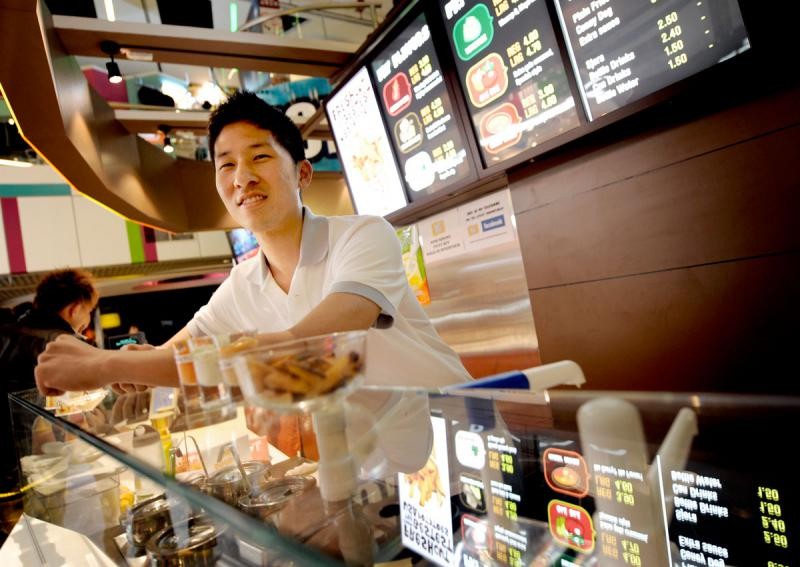Pop-up stores giving shopping malls a boost

Hit by rising vacancy rates and competition from e-commerce websites, shopping malls are turning to a temporary solution to attract shoppers - pop-up stores.
At least two companies have sprung up in recent months to play middleman between retailers looking for temporary shopfronts and malls with vacant spaces.
Invade, launched last month, has a pool of 38,000 retailers and 100 landlords. The four-month-old PopUp Angels has more than 100 spaces on its platform and several hundred brands on board.
Those looking to rent a retail space for a short term, usually between three months and a year, can browse a list of available spaces on both websites, which will earn a fee when there is a successful match.
Pop-up stores offer a win-win solution. Landlords can fill spaces in malls while looking for long-term tenants, and retailers get to reach out to new customers without committing to costly multi-year leases.
Shoppers benefit as well, because pop-up stores tend to have more diverse offerings, retail experts say.
Invade founders Kent Teo, 30, and Koh Cheng Guan, 29, started out as flea market organisers seven years ago and later ventured into multi-label pop-up stores. The idea for a real-time retail booking system came when more malls started approaching them with underused spaces.
"Two to three years ago, we would get about one landlord a month asking (for our help). But now, we get three to four," said Mr Teo, likening Invade to a "retail space Airbnb". Airbnb is a popular holiday rental site.
Invade's pool of retailers, gathered from flea-market-organising days, include online fashion labels, artisans and tech start-ups.
PopUp Angels was set up by Mr Adrian Chan and Mr Kit Chan, the duo behind food and beverage businesses Best Fries Forever and Cloud & Cream. The two 37-year-olds wanted to ease the "cumbersome" process of finding space and setting up and marketing pop-up stores.
More malls have been offering short-term leases in the past two years, as the supply of retail space outpaces demand, said Mr Adrian Chan.
Urban Redevelopment Authority data shows the islandwide vacancy rate for retail space rose from 4.5 per cent at the end of 2013 to 5.8 per cent a year later. At the end of last year, it was 7.2 per cent.
Retail space here grew in volume by 22,000 sq m in the fourth quarter of last year. Malls that have come on the scene recently include Capitol Piazza, which opened in Stamford Road last year, and Waterway Point, which opened in Punggol in January.
But demand for retail space has dampened, given high labour costs and growing competition from online platforms and regional shopping destinations.
Both online and brick-and-mortar retailers are starting pop-up stores, albeit for different reasons.
Furniture and lifestyle company HomesToLife last year opened two pop-up stores, at I12 Katong and Westgate, with leases of a year each - to "build momentum" in the lead-up to launching its flagship store, which opened in Mohamed Sultan Road early this month.
"The stores offered a sneak preview of our products and, by monitoring the sales there, we could better design our marketing campaign," said senior branding consultant Sotiria Kostavara.
Ms Samantha Soh, 27, who owns online clothing store Ellysage, opened her first standalone store at Orchard Gateway in January, with the help of Invade. She hopes to extend the three-month lease, which ends this month.
"For any fashion label, a physical store is important. A lot of my customers tell me they want to try on the clothes first," she said.
"It's also a very useful touchpoint... I can interact with my customers."
Singapore's largest mall operator, CapitaLand Mall Asia, which owns and manages 18 malls here, said pop-up stores form about 1 per cent of its tenants. In 2014, it opened retail zone J.Avenue at its JCube mall to cater to such stores, providing an electronic point-of- sale system and basic shop fittings to make it easier for first-time retailers.
Ms Sulian Tan-Wijaya, a senior director for retail and lifestyle at Savills Singapore, said the trend for such stores started three to four years ago, "but it was rare and not obvious to shoppers".
The trend is now more evident as more online, multi-label and indie brands are sprouting up in malls alongside established global retailers, she said.
"Pop-up stores will not pay high rents, as their business model does not allow for high margins," she said. "But they add diversity to the mall mix with their eclectic offerings and generate shopper traffic."
Mr Gary Nonis, property consultancy JLL's national director for retail, warned that too many pop-up stores in one mall could hurt the mall's branding in the long run. He said: "It might be deemed less attractive by seasoned operators, which would rather have strong branding, and this could also hurt their potential performance in the mall."
mellinjm@sph.com.sg

This article was first published on March 26, 2016.
Get a copy of The Straits Times or go to straitstimes.com for more stories.